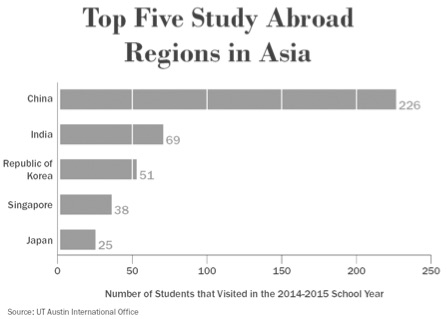As the festivities of the PyeongChang 2018 Olympic Winter Games begin, the UT International Office is warning students studying abroad in South Korea of the “amplified security measures” during the games.
On Feb. 5, the International Office released a risk and safety update making students aware of increased safety personnel in the Gangwon province of South Korea, tensions between North and South Korea and resources students should familiarize themselves with in case of emergencies.
“There are many types of emergencies that can impact travelers abroad, ranging from illnesses and stolen wallets to large-scale emergencies that include natural disasters, transportation mishaps, civil unrest and militaristic attacks,” said Jessica Miller, the director of Global Risk and Safety for UT’s International Office, in an email. “Global Risk and Safety responds to incidents in accordance with the type and severity of a given situation.”
The International Office was unable to disclose the number of students currently studying in particular regions within South Korea for privacy reasons, but UT does not currently have any official programs located within the Gangwon province, Miller said.
In its update, the International Office advised students that in the unlikely event of an emergency, they will hear air raid sirens and should immediately seek shelter in one of the 19,000 fallout shelters present in South Korea.
The International Office’s Global Risk and Safety unit pays close attention to world events. The unit alerts the University’s International Oversight Committee and International Crisis Advisory Team if emergencies abroad should arise, Miller said.
“Global Risk and Safety provides and continually refines health and safety training and protocols for both students and faculty leaders of student groups abroad,” Miller said. “Students receive mandatory health, safety and security training before departing for study abroad programs.”
Last spring, UT alumnus Roger Ybarra traveled to Seoul, South Korea. Ybarra said the International Office provided him with the necessary information in case he experienced an emergency.
Ybarra said in addition to taking safety measures, students should learn about a country’s political climate.
“Really get to know the political environment of where you’re going,” Ybarra said. “I went to South Korea knowing that there was tension between North and South (Korea), and so understanding that climate and understanding that people still live their lives in spite of the political tension allowed me to have a pretty fulfilling experience.”
Miller said the Global Risk and Safety unit has liaisons within the Overseas Security Advisory Council, which is part of the U.S. State Department’s Bureau of Diplomatic Security. The unit helps communicate security information to American constituents abroad.
The University also communicates with International SOS, a global medical and travel security company, which is located in numerous countries, including South Korea.
“The International Office has strong relationships with many partners across the globe, with whom we can connect to assist with a variety of issues,” Miller said.
International business senior Subah Ahmed, who participated in a study abroad program in Morocco this past summer, said she advises students to do their own research before their study abroad trip.
“Take it in small chunks because it can seem really overwhelming,” Ahmed said. “If you take it in small steps and try to figure out what exactly you need to know, then by the time you get there you’ll have a good idea and understanding.”




















